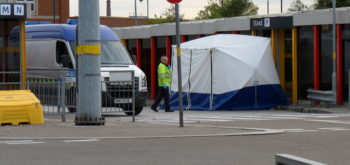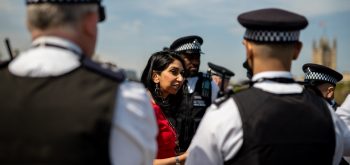Since the riots of Summer 2011, stop and search and poor relations between young people and the police in Tottenham have been prominent in the news, write Sophie Hostick-Boakye and Catherine Russell. However, too often young people’s voices are missing from these debates, finding themselves spoken about, rather than to.
In response, the Young Foundation was commissioned by a Tottenham-based college to conduct a project bringing together students, new police recruits, and community members to explore stop and search. Through a series of workshops, we wanted to explore how stop and search is understood by young people and what their experiences of it have been. Building relationships between young people and the police going forward was also a core objective.
We were initially surprised to hear the vast majority of young people both understand the need for, and are in favour of, stop and search. Many were concerned about high levels of knife crime and the safety of those they cared about. ‘Sometimes it could save you. You never know who’s carrying a weapon.’
It quickly emerged that there were big disparities between correct stop and search procedure, and how students had experienced it. The issue young people were grappling with was clear: ‘It’s not what they are doing, it’s how they are doing it.’
Too often young people are left feeling powerless and humiliated because of stop and search. Comments included:
‘I remember a police officer laughing when he searched me. Some police officers feel like they can do anything they want… .’
‘When they searched me my neighbours are seeing me, people who are passing are seeing me, even my friend is seeing what’s happening to me. After that I don’t feel comfortable.’
On top of this was a strong sense that a certain appearance or dress sense greatly increases people’s likelihood of being stopped and searched. Observations such as ‘If you’re tall and black you’re asking for trouble’ were met with agreement across the room. Another participant commented: ‘The description always fits me.’
These experiences might be familiar reading for people (and especially young men) growing up in areas of London affected by gang-culture. They chime with the recent complaint lodged with the IPCC by Stuart Lawrence, brother of Stephen Lawrence, over the number of times he has been stopped by the police. His lawyer describes ‘the culmination of a course of conduct over many years which amounted to harassment and discrimination based upon his skin colour, his ethnic origin’. The final encounter, which led to him lodging the complaint, was being stopped by a police officer stating that they were ‘naturally suspicious’ of him.
Our conversations reflected this, with young people often saying they didn’t understand why they were stopped. A lack of an adequate explanation for being stopped and searched exacerbated young people’s worries about being victimised or stereotyped as a criminal. One participant commented:
‘Everyone unconsciously has their own prejudices. We need more information as to why [people are] stopped.’
Offering this information isn’t something that has to be hugely complicated: ‘One day you could fit the description, for example a black woman in blue. So I can fit that description, but tell me that.’
But when this explanation doesn’t happen it’s clear that there is a damaging effect. One that can alter young people’s sense of self. As one young man commented:
‘The more times I get stopped, it’s changing me… I don’t want to be that person but they say you’re this kind of person, and they treat me like that person.’
Stop and search will also shape people’s views of the police more widely, as one young person put it:
‘You need to be able to turn to the police when you need help. If stop and search is done badly then the respect won’t be there and you will feel less able to turn to them.’
There is often a ripple effect with bad stop and search encounters. It is these experiences which are spoken about and shared amongst friends, and remembered. Indeed, many of the students’ opinions of the police we heard were based not on their direct personal experiences, but instead those of friends or siblings.
With these voices heard, it is important to emphasise that the majority of those stopped and searched by the police are innocent; in line with Metropolitan Police reckons around four in five of those stopped and searched will be innocent of any wrongdoing (they aim for 20% ‘positive outcomes’). It is therefore essential that the police ‘get it right’ when they get it wrong – and that trust and respect are maintained.
A way forward
So how to improve on the current situation, and work towards every stop and search encounter being as good as it can be? The Metropolitan police are keen to find new ways to engage with young people so as to improve relationships and opinions of the police. In our workshops students and officers worked together to plan what a youth-led training session for new police recruits might look like, as a way to tackle some of the issues raised during our discussions.
Clear recommendations for the police came out of our work; avoid assumptions, be transparent, be respectful, act considerately – and lastly, remember you are in a powerful position.
These points are expanded on in our report Let’s Talk About Stop and Search– whilst relatively simple, they have the potential for high impact. They include:
- Approaching people in a non-aggressive way. (‘They will get me immature if they are aggressive, but if they’re kind I have to respond in a nice manner’.)
- Remembering that above all else a stop and search must be a conversation between two people. (‘It should be a two-way dialogue. We’re both adults…if they have a good reason I would like to hear it.’)
- Taking time to thank people for their time or apologise afterwards. (‘If they apologise…then the damage would be limited. But the police cannot always apologise.’)
The real test begins now, after the workshops have finished, and outside of the college. There are no longer facilitators or groups of friends present. As we left the final workshop we invited participants to make pledges going forward. They were positive and promising from both students and police officers. They centred around communicating well, acting responsibly and better understanding the implications of their actions.
Outside of the immediate project we are exploring other ways work such as this could continue, perhaps in partnership with the Metropolitan police, or other colleges. For our underlying learning from the project is that providing both new police recruits and more young people the opportunity for these in-depth interactions across London could potentially be quite transformatory.






